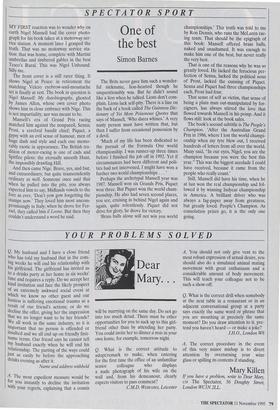SPECTATOR SPORT
One of the best
Simon Barnes
MY FIRST reaction was to wonder why on earth Nigel Mansell had the cover photo- graph for his book taken at a motorway ser- vice station. A moment later I grasped the truth. That was no motorway service sta- tion: that was home, complete with Martini umbrellas and timbered gables in the best Tesco's Rural. This was Nigel Unbound. Silly me.
The front cover is a still rarer thing. It shows Nigel at Peace: in retirement the matching Velcro eyebrow-and-moustache set is finally at rest. The book in question is Nigel Mansell: My Autobiography, ghosted by James Allen, whose own cover photo shows him in close embrace with Nige. This is not impartiality, nor was meant to be.
Mansell's era of Grand Prix racing matched him against the nonpareil, Senna; Prost, a cerebral bandit chief; Piquet, a gypsy with an evil sense of humour, men of huge dash and style and each one memo- rably exotic in appearance. The British tra- dition of motor-racing is one of cads and Spitfire pilots: the eternally smooth Hunt, the impossibly drawling Hill.
And then came Nige. Brave, yes, and fast, and extraordinary, but quite transcendently ordinary as well. Someone once said that when he pulled into the pits, you always expected him to say, Midlands vowels to the fore as ever, Don't yow gow forgetting the stamps now.' They loved him most uncom- promisingly in Italy; when he drove for Fer- rari, they called him it Leone. But then they couldn't understand a word he said. The Brits never gave him such a wonder- ful nickname, lion-hearted though he unquestionably was. But he didn't sound like a lion when he talked. Lions don't com- plain. Lions lack self-pity. There is a line on the back of a book called The Guinness Dic- tionary of Yet More Poisonous Quotes that says of Mansell, 'Who dares whines.' A very nasty person must have written that, but then I suffer from occasional possession by a devil.
`Much of my life has been dedicated to the pursuit of the Formula One world championship. I was runner-up three times before I finished the job off in 1992. Yet if circumstances had been different and poli- tics had not intervened, I might have won a further two world championships . . . '
Perhaps the archetypal Mansell year was 1987. Mansell won six Grands Prix, Piquet won three. But Piquet won the world cham- pionship. He also had seven second places, you see, cruising in behind Nigel again and again, quite relentlessly. Piquet did not drive for glory, he drove for victory.
`Brass balls alone will not win you world championships.' This truth was told to me by Ron Dennis, who runs the McLaren rac- ing team. That should be the epigraph of this book: Mansell offered brass balls, naked and unashamed. It was enough to make him one of the best, but never really the very best.
That is one of the reasons why he was so greatly loved. He lacked the ferocious per- fection of Senna, lacked the political nous of Prost, lacked the cunning of Piquet. Senna and Piquet had three championships each, Prost had four.
That sense of self as victim, that sense of being a plain man out-manipulated by for- eigners, has always stirred the love that flowed towards Mansell in his pomp. And it flows still: look at the book sales.
The book's second subtitle is The People's Champion. 'After the Australian Grand Prix in 1986, where I lost the world champi- onship when my tyre blew out, I received hundreds of letters from all over the world. Many said, "In our eyes, Nigel, you are the champion because you were the best this year." This was the biggest accolade I could have received, because it came from the people who really count.'
Still, Mansell did have his time, when he at last won the real championship and fol- lowed it by winning Indycar championship in America. A brilliant driver who was always a fag-paper away from greatness, but greatly loved. People's Champion. As consolation prizes go, it is the only one going.


















































































 Previous page
Previous page